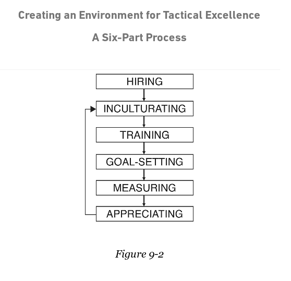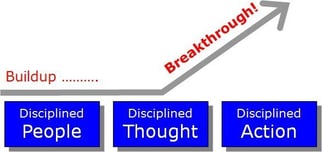 Jim Collins and Bill Lazier in Beyond Entrepreneurship 2.0: Turning Your Business into an Enduring Great Company have some news for you.
Jim Collins and Bill Lazier in Beyond Entrepreneurship 2.0: Turning Your Business into an Enduring Great Company have some news for you.
If your people aren’t executing well, it’s not their fault.
It’s yours.
This shouldn’t be news to you unless you blame your people for your poor execution.
Businesses today face a major challenge finding quality people due to the government’s unemployment incentives. We’re not denying this. Yet, good businesses keep and retain their best people.
Great leaders have faith in the ability of ordinary people to perform extraordinarily well. There are very few lazy, uncaring people. In the right environment, most people deliver outstanding performance.
Poor performance is usually the result of poor hiring decisions, poor training, lack of clear expectations, poor leadership, inadequate appreciation, poor job design, or some other failure of the company, not the employee.
Five Conditions Under Which People Execute Well
There are five basic conditions under which people tend to execute well:
- People execute well if they’re clear on what they need to do. How can people possibly do well if they don’t have a clear idea of what “doing well” means—if they don’t have clear goals, benchmarks, and expectations?
- People execute well if they have the right skills for the job. The right skills come from talents, temperament, and proper training.
- People execute well if they’re given freedom and support. No one does a good job with people looking over his shoulder; when people are treated like children, they’ll lower themselves to those expectations. Also, people need the tools and support to do their job well. For example, imagine how difficult it would be for Federal Express employees to make on-time delivery without reliable trucks.
- People execute well if they’re appreciated for their efforts. All people want their efforts to be appreciated. We’ve consciously chosen the term appreciated rather than rewarded because it more accurately captures excellent performers value respect and appreciation as much as, and often even more than, money.
- People execute well if they see the importance of their work.
This is the key to tactical excellence: people caring about their work because they see its importance.
Collins and Lazier share a powerful example from Peter Drucker of an airplane parts manufacturer during World War II. The company experienced problems with its workforce—absenteeism, strikes, slowdowns, and slipshod work.
So what to do?
Press people harder?
No.
Fire the bad apples?
No.
Increase wages?
No.
None of these solved the basic problem.
The workers had never been shown the importance of their work! They’d never seen a finished bomber, much less seen where the part they made fitted, or how important that part was to the bomber’s performance, or how important the bomber was to the war effort.
The company brought a finished bomber to the factory facilities. The crew members told them how important the bombers were to the war effort and how important the part was to the bombers.
According to Drucker, “the bad morale and unrest disappeared at once.”
The interesting aspect in the example: the presence of the crew members. No longer were the workers responsible merely for a part in a bomber, they were responsible for specific people—for George, and John, and Sam—whose lives depended on the performance of the bomber.
Help your people have a sense of direct, personal responsibility for each customer.
When people see the importance of their work, they’ll commit to doing a good job. They know other people depend on them.
Create an atmosphere where people are dependent on each other—where people think, “I can’t let these people down”—you’ll get extraordinary performance.
John DiJulius, a customer experience consultant for The DiJulius Group, shared this idea in Give More Customer Service - Las Vegas Growth Summit. He’s helped businesses create videos of their customers' experiences to help employees understand why their work is so important.
 Your Role: VISION & PURPOSE
Your Role: VISION & PURPOSE
As the leader of your company, you are responsible to make sure every single person is doing something important, and they know why his/her work is important.
The primary function of your corporate vision is to add meaning, to be a source of motivation for extraordinary human effort. A clear and compelling vision is essential to people seeing the importance of their work.
A good vision provides core values and beliefs, your guiding principles, and precepts. These core values guide your people’s daily behavior and standards. There is a direct link between values and tactical execution.
To create an environment where everyone is inspired to give their best, contact us today to schedule a free exploratory meeting.
Growth demands Strategic Discipline.
 Building an enduring great organization requires disciplined people, disciplined thought, disciplined action, superior results, producing a distinctive impact in the world.
Building an enduring great organization requires disciplined people, disciplined thought, disciplined action, superior results, producing a distinctive impact in the world.
Discipline sustains momentum, over a long period of time, laying the foundations for lasting endurance.
-2.jpg?width=260&name=3%20Disciplines%20of%20Execution%20(Strategic%20Discipline)-2.jpg) A winning habit starts with 3 Strategic Disciplines: Priority, Metrics, and Meeting Rhythms. Forecasting, accountability, individual, and team performance improve dramatically.
A winning habit starts with 3 Strategic Disciplines: Priority, Metrics, and Meeting Rhythms. Forecasting, accountability, individual, and team performance improve dramatically.
Meeting Rhythms achieve a disciplined focus on performance metrics to drive growth.
Let Positioning Systems help your business achieve these outcomes on the Four most Important Decisions your business faces:
|
DECISION |
RESULT/OUTCOME |
|
PEOPLE |
|
|
STRATEGY |
|
|
EXECUTION |
|
|
CASH |
|
Positioning Systems helps mid-sized ($5M - $250M) business Scale-UP. We align your business to focus on Your One Thing! Contact dwick@positioningsystems.com to Scale Up your business! Take our Four Decisions Needs Assessment to discover how your business measures against other Scaled Up companies. We’ll contact you.
NEXT BLOG – 7 Ways to Show Remote Workers Appreciation
Next week I’m taking a little R&R with my son Josh and visiting Red Rocks Amphitheater in Colorado to see KYGO perform. Guest writer Elizabeth Hines provides a good follow-up to help your People execute well by sharing 7 ways to Show your Remote Workers Appreciation. These are small things that appreciate and elevate your team. Be sure to read it next week.






.jpeg?width=150&height=135&name=Hand%20with%20marker%20writing%20the%20question%20Whats%20Next_%20(1).jpeg)

